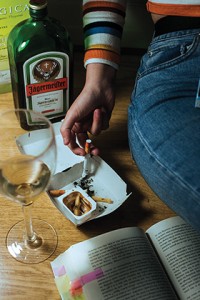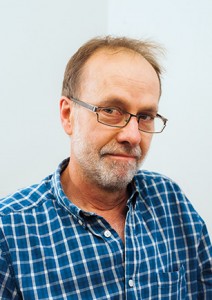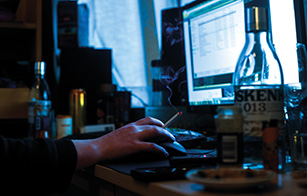To many people, student life is a constant opportunity to party. Alcohol is in abundance, as is the feeling that some drink too much. But who will speak out when someone goes from a little out of it to injuring themselves?

It is a Wednesday, shortly after lunch, and Emil is taking swigs out of a bottle of Koskenkorva. There are cigarette butts on the floor. The room is littered with vodka bottles and beer cans.
Emil lives in a corridor in one of the student residencies in Lund. His furniture is borrowed, the kitchen shared, and from his window he looks out over a grey, insipid lawn.
To Emil, this is all he needs. He likes it. Some stark folk music is coming from the speakers, he lights a cigarette and tells me about his day.
“This morning the alarm went off at 7:20 am. I made coffee, watched a documentary and drank some wine. Poured wine directly from the box into my mouth. I guess I drank for about half an hour. After that I went to school, did a presentation being slightly tipsy. It went well. Took a cigarette afterwards, listened to music and jiggled my foot. Bought a bottle of vodka which I drank on the bus going home. A woman in her forties was sitting next to me, but she only laughed. She must have thought it was nice.
Emil studies his second year on a programme in Lund. But this was not where he started his drinking. The first time he got drunk was at the age of ten. It was at a family gathering, and already then he claims to have liked the high.
After that he drank a few times a year, until upper secondary school when the drinking really took off. Then, the weekends were all about maxing out on drunkenness. Getting wasted. Getting barfing pissed. But he also drank alone.
“There was a lot of lonely drinking. Especially during the second term of the first year, the entire second year and large parts of the third. By then I drank all the time during weekdays,” Emil says.
He doesn’t know where the need to drink comes from. His family circumstances were ordered; his parents basically non-drinkers. But Emil has had a troubled psyche since the age of ten. At eleven, he started thinking about suicide.
“I don’t really know what it is like to fit in, or what it is like to live in relation to people who like each other. It has never been clear to me. I have never felt part of the world,” Emil says.
Upper secondary school was not that long ago. Still, Emil has noticed that his way of drinking has changed since he started studying at university. Going from mostly drinking alone, he now appreciates getting drunk together with others. Mostly with a friend from his programme. Always staying away from nights at the nations, they socialize at home.
“We share some vodka and maybe a beer, sitting down talking all evening, getting wasted and having a great time,” Emil says.
But in return, narcotics have made their way into his life. Emil smokes some pot, and when we meet up in his room he is searching for powder in old bags of speed.
After a while he remembers: he used the last of it to spice his morning coffee.
“To be frank, if the choice was between alcohol and narcotics, I’d choose alcohol,” Emil says.
According to Emil himself, he is no drug-abuser. Abuser, to him, assumes negative consequences to one’s drug-use. Emil admits that alcohol can damage body and mind, but says that all his memories are nothing but positive.
Emil feels best when he is drunk. That is why he feels free to romanticise. There are no complications. Alcohol is nothing but a great taste in the mouth and a nice feeling in the body.

“This person you are telling me about … I don’t know who he or she is trying to fool.”
Richard Wastenson has worked for Student Health in Lund for 15 years offering everyday support for students.
Yearly, Student Health gets just under 4,000 visits from 850 people. Out of these, around 40 people seek counselling because they are explicitly worried about their drinking habits. During dialogues, however, the numbers may well rise with another 100 people who have everyday problems partly related to their drinking.
“Rather few seek help only because of problems with alcohol. On the other hand, a lot of people come here looking for help because of life crises, studies not working or anxiety and depression. When we talk to these people about their life-styles, some of them prove to have quite the monstrous alcohol consumption influencing their way of functioning. If so, it’s suddenly rather large volumes,” Richard Wastenson says.
In Lund, as well as nationally, alcohol consumption is largest among young adults (ages 18-25), and half of all young adults are students. In a survey made by the Public Health Agency of Sweden in 2014, 680 students were asked about their drinking habits. Close to 50 percent proved to have dangerously high alcohol consumption. For many, this lead to an increased risk of poor health, accidents, violence, and sexual risk taking.
Richard Wastenson has been granted the ability to speak about his subject without breaks. He needs no questions. Everything pours from him incessantly no matter if he is calmly seated in a chair or up and running looking for various papers. He explains that more than half of the people coming to Student Health with alcohol-related problems are connected to nations or unions, some through full-time jobs. Richard Wastenson believes that the nations serving of spirits generally works.
“The problem rather lies in the inner party life; during compensation parties, or going on some cycling-kerfuffle, or at a kick-off in a cabin with half the nation or union. That’s when it could really derail. Some students will develop most of their future alcohol addiction-problems at a nation,” he says.
At Student Health, Richard Wastenson has heard it all. People lose control. Black out. Are accused of rape. Fall down stairs. It seems as if though social backlashes connected to heavy drunkenness is something of a pillar in student life. He describes the problems in Lund as threefold. Alcohol romanticism has gone too far, representational drinking in nation management is too widespread, and the work with basic values inferior.
“In my mind, there is something of an identity crisis in nation life. What do you really want out of your nation? The nations need to figure out what they are doing. I have met part of the quratels here throughout my years, and some drink far too heavily. At the same time, they are responsible for the nations’ basic values. It doesn’t work,” Richard Wastenson says.
Oskar Palmerot, acting chairperson at Kuratorskollegiet, KK, sees no problems with neither representational drinking nor alcohol romanticism.
“Those are internal issues,” he says about the first.
“There is talk about punch romanticism, but people today are not drinking punch at every street corner”, he says about the second.
The nations’ own work with alcohol consists of a two-day course every term directed at those selling and responsible for alcohol at the nations. Brought up is everything from serving to fire security. There is, however, no over-arching work with basic values, even if there are differences in policies between nations.
Oskar Palmerot can still remember talking internally about drinking at some kick-offs at KK.
“This term and the previous one, personal drinking was discussed. We talked about what it is like to become the boss over your friends and about checking up on each other inside the quratel. That’s the level of discussion we have had.”

Jesper Sjöström Strobel appears to have been snatched from an academic environment of old. He dresses in tweed, wears a bowtie, and his glasses are round and elegant. He is the chairperson for the Student Union for Science Students, Luna, and during his free time he plays the French horn in one of the student orchestras.
Jesper Sjöström Strobel is a strange bird in Lund’s student life. He is an active part in the party scene, yet a non-drinker. Practically, this means that instead of grogs, he downs soda, but he still makes enough noise to be dragged down from the tables by the marshals.
“I’m not walking around an angel just because I don’t drink. To me, that’s not about your drunken level. No matter if I’m drunk or sober, I have fun and get up to no good,” Sjöström Strobel says.
But his relation to alcohol has not always been entirely uncomplicated. In 2011, he stepped off the train in Lund. February 2013, he stopped drinking. There were some wet years in between.
He points out that he was not unused to alcohol before arriving in Lund, but that it was here that it started spiralling. Union activities, pubs, sittningar, parties at the nations, home parties, balls, dinners. There could easily be a party five-six times a week. It was great fun for a while, but then it started getting out of hand.
“I often drank alone at home, and at times even during the mornings. I could down more than one bottle of whiskey on my own in one week. And then the parties on top of that,” he says.
Jesper Sjöström Strobel also doesn’t agree that the problem lies in the quratels’ representational drinking or in alcohol romanticism.
“Many people like the alcohol romanticism and are not damaged by it. The nations are social activities which are about having fun and showing your skills in socialising. Part of that is drinking at parties,” he says.
Instead, he wants to show acceptance for the people who abstain.
“It’s about trying to show that not everyone wants to get drunk.”
In the Public Health Agency’s survey from 2014, 54 percent of the students said that they at one point or other worried about their fellow students’ drinking habits.
In an enquiry to full-time employees at unions and nations that Lundagård sent out, the same pattern emerges. Out of the 36 people responding to the enquiry, 58 percent felt that someone in their vicinity drank too much. Many of these people had not ever wanted to point this out, however. Two of the respondents write that they themselves drink so much that it would by hypocritical to comment on other people’s consumption. A third respondent feels that he or she won’t be taken seriously.
“When I hold lectures about alcohol, I usually ask the audience how many have a friend that drinks too much. A lot of people raise their hands, certainly 75 percent. Then I ask if they have talked to this person about the issue, at which point the hands quickly go down,” Richard Wastenson says.
Jesper Sjöström Strobel recognizes the silence of the surrounding world.
“No one ever talked to me about it. But afterwards, many have said that they noticed it. That irritated me; that they knew but didn’t speak up.”
Emil agrees.
“Even if people can feel the smell of liquor, I believe that many avoid bringing it up. You put yourself in a weird position if you mention anything.”
Ina a report by the IQ-initiative from this year, half of the 7,000 inquired students responded that it is hard to find a place in the student life if you don’t drink alcohol.
7 out of 10 believes that there are occasions, often in connection to sittningar, where it is deemed natural to drink. Many people have for that reason avoided participating in certain activities.
A broad inclusion is thus no main attraction among the largest actors in student life. Focus is on alcohol, while many are not primarily interested in getting drunk.
“It’s important to point out that the average student doesn’t drink that much. Out of all the thousands of students, maybe a fourth jazz around in nation life. The remaining 75 percent go out at times, but it’s no big business for them,” Richard Wastenson says.
To get out of excluding students within the student life, the Swedish National Union of Students, SFS, will launch a project together with the IQ-initiative during the spring. The idea behind the project is to try and work out a more inviting and smarter drinking culture within student life.
“It’s not a sobriety project, but about creating a drinking culture where alcohol can exist as well but doesn’t have to stand at the centre of things. As it is, many students are expected to drink a lot, which not everyone feels comfortable with. That is why we want to work towards changing the norm surrounding alcohol,” says Kristina Hållén, project manager at SFS.
Much is still at a planning stage, but the hope is that the unions in Lund will be part of the project during 2015.
A red thread throughout the interviews is also the silence of the surroundings. The possibility to drink without anyone reacting.
“Moral courage is not only about physical violence, but also about psychological poor health,” Jesper SJöström Strobel says.
“Snooping around just that little in other people’s alcohol consumption is probably very important,” Richard Wastenson says.
Everybody seem to agree on the importance on dialogues between people. Even still, all those hands go down when Wastenson asks who have told their friends that they drink too much.
The answer why might be had in a kitchen in AF-Borgen. Here sits Jesper Sjöström Strobel, talking about the approach of his surroundings. On one hand, some people noticed that he drank too much. On the other, many pushed him into drinking when he sobered up.
Party drinking is a norm. Out of that, the push of the surroundings surely rise. Alcoholism and psychological poor health have been taboo for a long time. Therein the explanation for your friends’ silence probably lies.
“It’s rather speaking that so few know how to handle people who are psychologically ill. We are taught first-aid, but not how to help someone with a depression. And depressions are very common, after all,” Jesper Sjöström Strobel says.

Back to Emil’s corridor room. He is lively and throws himself freely from subject to subject. Tonight, he is drinking with a friend. Watching a good movie. Getting tipsy. Traditional student life is of no concern to him. He finishes his courses, not more.
He doesn’t quite like people involving themselves in the way he lives his life. At the same time, something worries him.
“The worst thing would be if my family found out. I don’t want to upset them. I have thought about it. No explanation would work. I know them, after all. They would make everything bigger than it is and shame me,” Emil says.
But for now, he doesn’t feel like he has any troubles. He is content. And drinks away without a care.
*Emil is not his real name.
Text: Linus Gisborn
Translation: Carl-William Ersgård
What is hazardous drinking?
- For women: to drink more than 9 standard glasses in a week.
- For men: to drink more than 14 standard glasses in a week.
- Drinking that much is called high consumption, which is connected to an increased risk of damages and diseases. Long term, it could also lead to an addiction.
- A standard glass: 12 grams of alcohol, which is a can of folköl (50 cl), 4 cl liquor, a glass 12-15 cl wine and a bottle of starköl (33 cl).
Source: the Public Health Agency of Sweden






